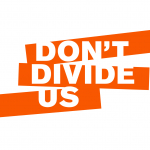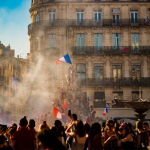Laïcité and the Need for a Narrative-in-Common
Recently, DDU supporter and lecturer Marie Kawthar Daouda presented a thoughtful and thought-provoking essay which considers the historical development of Laïcité in legal and philosophical terms. She questions whether Laïcité is as universal as some claim, and if it is capable of providing the resources needed for French society to be able to integrate its immigrants. We are delighted to share a version of her thoughtfully critical and informed introduction here:
‘Laïcité’ is an untranslatable word. Should one go for ‘secularism’, one would miss the historical and political context in which the division of Church and State happened in France. Our modern understanding of Laïcité in France is twofold. There is the philosophical aspect, rooted in the Enlightenment, and the legal aspect, that is to say the 1905 law, which President Emmanuel Macron has been aiming to reinforce lately when addressing the issue of separatism.
The legal definition of Laïcité is based on three elements:
- First, it guarantees freedom of conscience and the right to express one’s beliefs and convictions while respecting public order. Laïcité implies the state’s neutrality and makes everyone equal before the law regardless of religion or conviction.
- Secondly, it guarantees believers and non-believers the same right to the free expression of their beliefs or convictions – or lack thereof. While Laïcité also guarantees the liberty of cults, no-one is obliged to respect religious dogmas or prescriptions.
- Finally, laïcité implies the separation of State and Religious organisations. The state can neither recognise nor fund any cult or relgious body.
As you notice, these elements are all based on an opposition between a non-religious state on one side, and on the other side, potentially, but not mandatorily, religious individuals.
This legal definition of Laïcité was meant to take France back to the roots of the Republic. It was Napoléon who instituted the concordat, an agreement between State and Church in terms of real estate, but also of public celebrations and holidays. This is why France keeps Christmas, Easter, the Ascension and the Assumption as bank holidays. In doing so, Napoleon was taking a large step away from the Republican rejection of Catholicism. Émile Combes, the premier between 1902-1905, was a former Seminarian whose grudge against the Church was inextinguishable. He was one of the most vocal defenders of the 1905 law and presided over its introduction. Although the 1905 law can rightfully be read as a means to protect individual belief, it was intended to prevent the moral influence of religious orders – especially the teaching orders. Moreover, the dismantlement of many teaching and contemplative orders after 1902 contributed to diplomatic tensions between the Third Republic and the Vatican. Nonetheless, the law was a product of a conern for freedom of speech and thought, as well as a response to matters of international politics.
The philosophical discussion of Laïcité
The legal definition of Laïcité does indeed stem from a tradition of skepticism and anti-Catholic ideas. The legal definition insists on the distinction and equal treatment between ‘the ones who believe’ and ‘the ones who do not believe’. This law guarantees freedom of opinion and religion, but it is also designed as exogenous to religion, thus putting every religion under the same blanket. As a result, within this legal frame, France has a hard time balancing a universalist understanding of laïcité as entailing the right to follow any religion and express any religious opinion, and the opposite, interdictory aspect of Laïcité with regards to public displays of religious symbols. In other words, anyone can be religious – privately, but the state is Laïc. The trouble is that the state is conceived simultaneously as being an abstraction and an organic union of individuals.
Laïcité built itself as external to Catholicism, but also, interestingly, defined itself by using Islam as an external border. For 18thC philosophers Montesquieu and Voltaire, Islam exerted a sort of fascination. Both of them were intrigued by Islam’s conjunction of religious and political power, by the swift execution of justice, by the oddities that, eventually, revealed much more about European, French, and Parisian cosmopolitanism than about the state of the Ottoman Empire. For example,Montesquieu’s De l’esprit des lois(1748) —discusses the division between legislative, executive and judicial power, typical concerns of issues Enlightenment political thought. But he was also the author of Lettres persanes (1721), a fictive epistolary novel describing Paris through the Persian gaze. Montesquieu used the figure of the ‘Oriental despot’ as a means to reveal weaknesses in the French Absolute Monarchy. As for Voltaire, in his play Mahomet, he describes Muhammad as a man able to use others’ faith to establish his own power. Their concern was less with rendering empirically accurate descriptions of non-European societies than with creating discursive tropes with which to critique aspects of French society.
This suggests that the Enlightenment construction of a cosmopolitan political agenda was essentially European, while excluding some others. The Enlightenment concept of universalism emerged in contradistinction to two opposing civilizational models epitomized in Toqueville’s De la Révolution en Amérique on one hand, which created the idea of a West based on America, democracy and slavery : and on the other hand, an East based on Islam, absolutism (and also slavery), epitomized in Montesquieu’s Lettres persanes. L’abbé de Saint-Pierre defended an idea of Europe as a political unit, a European Diette, and considered Russia as part of it — but not Turkey. The Enlightenment’s understanding of Universalism saw Islam as its defining otherness. The Enlightenment could only be universal and universalist if it took a symbolic ‘east’ as a foil. In this sense, the geographical notion of Europe was less important than the one of Christendom.
Laïcité and relgion
Rousseau was enthusiastic about the idea of a united Europe, but he saw it as a utopia more than a feasible political project. Rousseau’s social contract was not as strictly horizontal as it seems: in his view, the Legislator still embodied a form of transcendance insofar as he ensured a connexion between law and religious instincts. In Du contrat social, III, of 1762, he writes :
As soon as humans live in society they need a religion that would keep them within it. No people ever has subsisted nor shall subsist without a religion, and if he was not granted one, he would make one for himself or would soon be destroyed.
(Du contrat social, 1762, III)
This notion of a religion ‘keeping people within’ society seems quite different from the 1905 legal definition of Laïcité.
To make up for the lack of social religion, the French Republic did its best to create one of its own. Président Macron’s speech on the 20th of September had to slalom between the expression of two necessities – maintaining free speech and the freedom of opinion, and condemning and punishing Islamic violence. The trouble is that these two elements find soil in the same law.
Although France claims to be secular, it is culturally Christian, that is to say that its laws have Christian prerequisites. Even the staunchest defenders of radical Laïcité has to speak about right and wrong, good and evil in times of trouble. A living proof of this is the change of tone in the magazine Charlie Hebdo during the daily accounts of the trials. The magazine, famous for its relativism and its lack of respect for religious beliefs, switched to an almost-sanctimonious sacralisation of truth in the name of freedom and Laïcité. The trouble is that ‘Laïcité’ is hardly something people could identify with, as it is an identity void, a blank space meant to be filled by different things that are erroneously deemed to be identical or equivalent. For example, on the French Government webpage we find the following :
Laïcité is not an opinion among others but the freedom to have one. It is not a conviction but the principle that allows any conviction, within the limits of public order. Laïcité could have been a unifying force a hundred years ago, as an opposition to the hegemony of the Church over education and its land-owning rights. The 1905 law was meant to deal with several shades of Christianity, not with Islam – in other words, the legal frame of Laïcité was not designed to address the problem of people beheading others due to religious offence, while the concept of Laïcité floats high above the people’s beliefs and social practice.
Laïcité and Islam
One would argue that there is a difference between peaceful Islam and the religion of violence embraced by some, who regard an entire part of the French population as a threat to their beliefs ; a threat that, if actualised in words or images, merits death. For example, when the teenager Mila received death threats for having expressed her contempt of Islam in January this year, Abdallah Zekri, the General Delegate of the Conseil Français du Culte Musulman and president of the Observatoire National contre l’Islamophobie declared: ‘ She reaped what she sowed’. On the same day, the president of the Conseil Français du Culte Musulman, Mohammed Mousaoui, said that ‘nothing could justify death threats, however offensive her words had been’. Shortly after, Moussaoui declared ‘Some Muslims are mislead when they think they are defending their religion’s dignity by threats, violence or abuse’ and that Muslims should accept ‘that Islam could be criticized even in its principles and foundations’.
Moussaoui’s intervention is completely in line with the principles of Laïcité. However, the violent punishment of blasphemy is a direct application of the Shari’a as it would have been in Islamic states. These acts should not be called terrorism – when terrorist organisations commit violence, they aim to make a political revendication heard. There is no overlapping between a terrorist act and its political end. On the contrary, what is erroneously labelled as Islamic terrorism is in many cases – and in the case of Samuel Paty’s murder for instance, radical Islam justice. In Saudi Arabia, Afghanistan or Iran, the caricatures, their creators and disseminators in the public realm would have been legally guilty. Samuel Paty’s murderer or the Kouachi brothers did not see themselves as terrorists but as enforcers of justice, rightfully punishing an offense.
So what is wrong with Islam? A radical shift happened at the end of the 1970s, when the Iranian empire collapsed. It is hard to believe that in the 1950s and 1960s, countries such as Iran, Afghanistan, or Egypt saw nothing wrong about dressing in the Western fashion while still maintaining a keen taste for traditional costumes and music. The unleashing of obscurantism in Islam owed a lot to its intertwining with Marxism. Foucault, Sartre and Beauvoir, for example, defended the upheavals in Iran, reading the Islamic revolution as a popular insurrection that would give way to some sort of Socialist utopia. We know what the outcome was.
National identity and integration
France now welcomes immigrants in a state that claims to be a cultural blank slate. When I was ‘made’ French, the ceremony began with a short film on French history and culture, but it only began with 1789, as though any foreigner could feel no connection with pre-Revolution France. What room does this leave for all the previous centuries? When tourists come to Paris, it is not the Centre Pompidou or the Bibliothèque François Mitterrand they rush to, but to the remains of the Ancien Régime. The international reaction when Notre Dame was in flames was a striking image of what pre-1789 France means, internationally. Does this imply there is no room for other cultures, rites or religions? Quite the contrary. In order to be able to express their collective heritage as well as their individuality, newcomers need to be welcomed somewhere. This idea brings us back to the point I make in the article about the somewhere/anywhere divide. It is a state’s duty to teach whoever lives in it about its history. Everyone would agree that this History should not be hagiographic, but critical distance does not imply total denial.
I would particularly like to draw the attention on overlooked French thinkers – most of the time, French thought is presented as polarized between the 1900’s nationalists – such as Charles Maurras and Maurice Barrès, and the following generation which culminated with the socialist trio aforementioned. There is, however, more complexity than that. The idea of belonging is by no means linked to an identitarian fusion of Church and State as envisioned by Charles Maurras. Albert Camus, for instance, was by no means a churchman, although he admired the Catholic involvement in the Résistance, but he definitely stepped away from Sartre when the latter turned Existentialism into a sub-faction of Marxism. For Camus, it is within the individual that any revolt should occur, and he saw any political use of this inner revolt as intellectually dishonest. He was quite close to Simone Weil, a Catholic socialist and mystic, who argued that it is the intertwinement of roots and lineages that grant the individual an irreplaceable role in society.
From an immigrant’s perspective, I can only agree with Camus and Weil. When one lands somewhere, what one needs is not a blank slate, but a narrative in which one can take a place. None of my biological ancestors walked under the shade of Notre-Dame or among the narrow streets of Oxford, but I know Albert the Great, Victor Hugo, Baudelaire, Thomas Moore, Cardinal Newman and Oscar Wilde walked these same streets, and through their gaze, I can appreciate and love the treasures that have been preserved. As Cardinal Sarah wrote ‘It is hard to imagine that such a brilliant civilisation could decide to abandon so many riches without understanding anything of this loss.’ We need some incarnate mediation to appreciate the past, be it historical figures, buildings or works of art. The divisive rewriting of history is not only damaging to Westerners in the present, it jeopardizes a chain of transmission that is supposed to teach our descendants about the struggles, the hopes and the ideals of our forefathers.
Dr Marie Kawthar Daouda was born and raised in Morocco and educated in France. She teaches French language and literature at Oriel College – University of Oxford. Dr Daouda’s research looks at the ways political crises shape artistic creation and belief systems. She works on the reception of the antiquity in nineteenth and twentieth-century French and English literature, and on the codes of representation of good and evil in arts.
Dr Daouda writes about education, diversity and social politics in Britain and in France fo various British and American publications.


